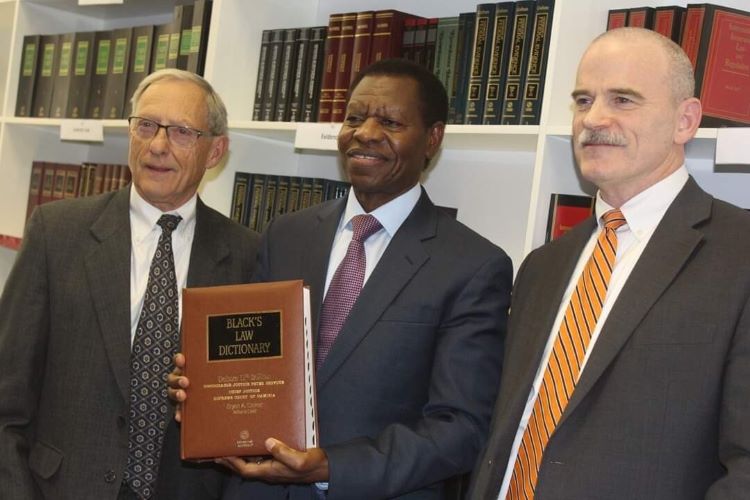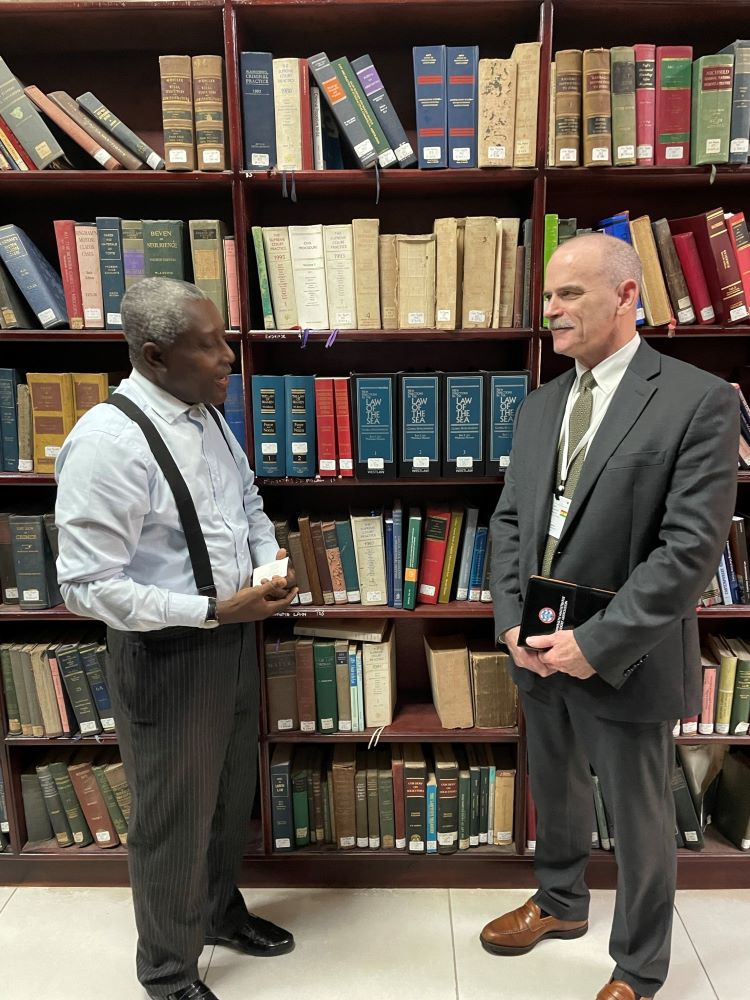Minnesota group ships law books to Africa

Lane Ayres (from left), director of the Jack Mason Law & Democracy Initiative of Books for Africa; Chief Justice Peter Shivute of the Namibia Supreme Court; and Tom Leighton, vice president at Thomson Reuters at a book ceremony. Photo courtesy of Tom Leighton.
A law book can change a life. Donations from 117 law libraries to 24 African countries have changed millions of lives and helped to establish the rule of law across the continent, says Lane Ayres, director of the Jack Mason Law & Democracy Initiative of Books for Africa.
The rule of law is the foundation for any stable society, Ayres says, and it continues to be challenged in a number of countries in Africa.
“You have to have a legal basis for society. Legal training and practice by lawyers is one important way,” he adds. “What we do is a small drop in the bucket, but it has its significance to provide lawyers and law schools with the tools they need to be successful.”
The idea to send legal books to Africa first took root decades ago when Ayres was a law student and spent the summer in Ghana. That’s when he visited the Ghana School of Law in Accra and noticed the scarcity of books.
Later, as an assistant district attorney in Hennepin County, Minnesota, Ayres got involved with a nonprofit organization, Books for Africa, based in St. Paul. And in 2008, Ayres met Thomas Pfeifer, a neighbor and an executive with Thomson Reuters, at a potluck where they discussed collaborating on a project to send new law books to Africa.
Thomson Reuters is one of the world’s largest legal book publishers and has a big facility in Eagan, Minnesota. Thomson Reuters is the only publisher contributing to this program, although funding also comes from lawyers, judges and legal organizations nationwide.
Pfeifer wrote a memo to Thomson Reuters’ leadership, kicking off the 14-year partnership that continues to send entire legal libraries to African countries that have a scarcity of law and human-rights books.
“I’ve been here 27 years, when I look back at my career, that memo and what it has led to is one of the top three things I’m most proud of,” Pfeifer says.
The initiative is named after Jack Mason, a federal magistrate judge and Books for Africa board member. He died unexpectedly in 2002 at 63 from a heart attack.
Two of Mason’s good friends, Kofi Annan, former U.N. secretary general, and Walter Mondale, former U.S. vice president, served on the initiative’s advisory board and helped to promote the cause.
 Tony Addy, the law librarian at the Ghana Supreme Court, and Tom Leighton, vice president at Thomson Reuters. Photo courtesy of Tom Leighton.
Tony Addy, the law librarian at the Ghana Supreme Court, and Tom Leighton, vice president at Thomson Reuters. Photo courtesy of Tom Leighton.
Every year, the Jack Mason Law & Democracy Initiative ships 10 reference law libraries to Africa. Each law library costs $20,000 for 200 books, Ayres says. The books are primarily in English but have also included French and Portuguese versions. The books span the breadth of the legal system, including common law, business law, human rights and international law and legal process.
“It evens the playing field for African lawyers and judges when they are up against lawyers from other countries that are coming in and getting their way in a particular contract,” Ayres says.
Over the 14-year period, most of the books have gone to law schools and bar associations. But in 2019, the initiative began sending books to court systems, including Namibia, Botswana, Ghana and Sierra Leona Supreme Courts. It also works with the Attorney General Alliance to send books to attorney generals, prosecution offices and other legal organizations in African countries.
The America Bar Association sponsored the first Thomson Reuters reference law library shipment in 2008 to the Grimes School of Law at the University of Liberia, Ayres says. Throughout the years, the ABA also sponsored law libraries sent to Sierra Leone, Ethiopia and Liberia, he adds.
“ABA support for the international distribution of legal materials dates at least as far back as the early 1990s, when the ABA Central and East European Law Initiative began facilitating the delivery of law books to emerging democracies,” says the ABA’s new Associate Executive Director of the Center of Global Programs Scott Carlson (previously the senior director for Programs and Strategic Initiatives at ABA ROLI).
“While the rise of the internet has revolutionized access to legal information, not everyone has access to rapid connections, and law books continue to be a valued resource in developing environments,” Carlson adds.
The donations can be life changing, Ayres says. In the Gambia, a women’s law organization received a law library donation. At the time, the Gambia was run by a despotic ruler and women were not treated as equals. Ayres met with the women’s organization in their little storefront with a conference room that contained the law library.
“They were just tearful when we met,” Ayres says. “They have male lawyers coming to their offices to use the library, too. The status that it gave them was significant. To be taken seriously as women lawyers was quite something.”
The goal and objective of the program is to advance the rule of law and access to justice across the entire continent, says Sharon Sayles Belton, vice president of community relations and government affairs for Thomson Reuters legal business and former mayor of Minneapolis.
The impact of the law book donations is profound, says Sayles Belton. Students are better informed, the public is better served, and the countries are more stable. The rule of law is the foundation for financial and social impact investments. When countries have policies, rules and procedures in place, that encourages and invites economic growth and prosperity, she adds.
“Our work is far from done,” Sayles Belton says. “There is so much more to be done to address the disparities around the globe. We are helping to build a solid foundation for the civil societies that are emerging and growing across the continent, and we want to keep doing that.”
There are 54 countries in Africa, so Sayles Belton said there is plenty of room for the project to expand and reach even more people. There are no plans to expand beyond Africa.
Partnerships are critical for the program’s success, Sayles Belton says. Law schools and law firms in the United States participate by donating money and books, and they carry the message through their networks.
In February, Tom Leighton, vice president at Thomson Reuters, traveled to Banjul, the capital of the Gambia, with a group of British judges who were there to train the Gambian judiciary on sentencing guidelines.
“We heard a lot of hopeful talk about the rule of law and independent judiciary,” says Leighton, who is an ABA member and also a member of the ABA Judicial Division Court Technology Committee.
In September, Leighton flew to Accra, Ghana for a commonwealth magistrate conference with 400 attendees from 46 commonwealth countries. He visited with four organizations that have received law libraries. Some of them were new donations, and others are a decade old.
“Our nonprofit legal aid center relies on the support of organizations and individuals for its operations,” Afua Adotey, president of the International Federation of Women Lawyers in Ghana, said in an email. “The law library donated by Books for Africa to FIDA-Ghana was very much appreciated, as it provides lawyers at our center to use a modern library at our premises when providing services to our clients and constituents.”
This project is bigger than the law, Sayles Belton says. “This is a project that one of the ambassadors said is absolutely critical to world peace,” she adds. “He said if we can get our children educated, and if we can fully adopt the rule of law, we can further peace and stability in our country, in the continent and in the world. It’s a powerful statement, and there is a heck of a lot of truth in it.”



